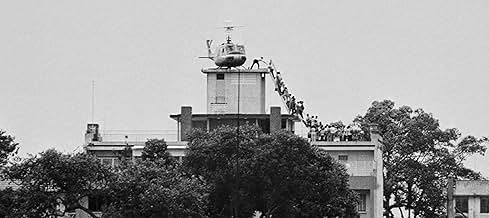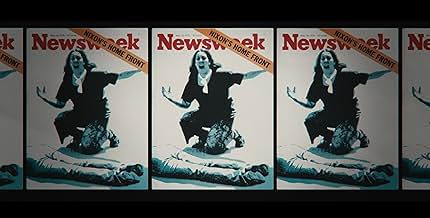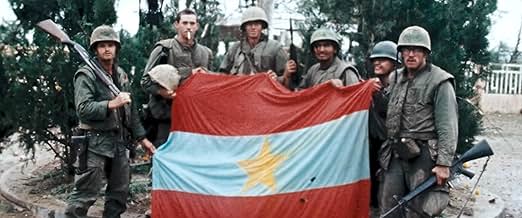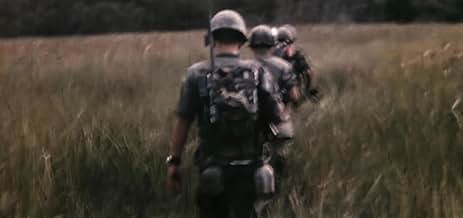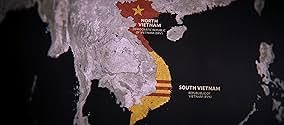Punto de inflexión: La guerra de Vietnam
Título original: Turning Point: The Vietnam War
- Miniserie de TV
- 2025
- 1h 15min
Los profundos efectos de la guerra de Vietnam en la identidad estadounidense, que provocan divisiones sociales y erosionan la confianza del gobierno. Más que una derrota militar, transformó ... Leer todoLos profundos efectos de la guerra de Vietnam en la identidad estadounidense, que provocan divisiones sociales y erosionan la confianza del gobierno. Más que una derrota militar, transformó la política y la cultura estadounidenses.Los profundos efectos de la guerra de Vietnam en la identidad estadounidense, que provocan divisiones sociales y erosionan la confianza del gobierno. Más que una derrota militar, transformó la política y la cultura estadounidenses.
Explorar episodios
Opiniones destacadas
I really enjoy this kind of documentary, especially because its length - over five hours - allows it to take its time and properly explore a story from as many angles as possible.
What struck me most, personally, was that I ended up feeling sympathy and even a kind of sorrow for both sides. The filmmaker makes a real effort to stay as neutral as possible, showing the motivations - and especially the suffering - on both sides of the conflict.
One real eye-opener for me was what happened to the South Vietnamese who had worked with the Americans, after the US defeat and the communist takeover. It was shocking to see the consequences they faced. And what's more, the country is still divided in many ways because of this war - emotionally, politically, socially.
Neither side is painted as the bad guy.
What struck me most, personally, was that I ended up feeling sympathy and even a kind of sorrow for both sides. The filmmaker makes a real effort to stay as neutral as possible, showing the motivations - and especially the suffering - on both sides of the conflict.
One real eye-opener for me was what happened to the South Vietnamese who had worked with the Americans, after the US defeat and the communist takeover. It was shocking to see the consequences they faced. And what's more, the country is still divided in many ways because of this war - emotionally, politically, socially.
Neither side is painted as the bad guy.
I enjoy learning about 20th century American history, and the Vietnam War is one of my favorite documentary topics. I was initially concerned that this documentary would be filled with anti-American bias, however, it was much more balanced than I expected. The burning of villages by American/ARVN forces was discussed in one episode, for example, but it was also acknowledged that the North Vietnamese did a lot more of that kind of destruction. In one episode, a Viet Cong woman explains why she hated the Americans but also notes that many North Vietnamese didn't really understand what communism entailed. On the other hand, you had one million living in the North flee to the South when the civil war truce occurred, suggesting that many people did understand what life under communism meant (somewhat reminiscent of the East Germans escaping to West Germany, or maybe those Koreans living in the North who relocated to the South). To me this suggests the North Vietnamese victory was a pyrrhic one because while North Vietnam won, the people still didn't have most of the freedoms some people in the West take for granted nor the power. Of course, no more foreign control or interference. But I wonder if their lives changed for the better. We do know a million people from the South escaped (boat people) four years later.
Some critics have said that this documentary is a little too biased for their tastes. But I, someone who gets annoyed when I hear bias, didn't think so. To be sure, there was one guy in Episode 5 who annoyed me because I think he was being dramatic for the camera. Nevertheless, everyone else spoke in a measured way with occasional sincere emotions. All facts to me, and interesting perspectives, too. Some critics also suggest some important details were left out. I think this is true to some extent. No mention of the death of Ho Chi Min in 1969, for instance. I don't think General Giap was mentioned either. Still, I think for a five episode series, and given it's aim, it was wonderfully edited and directed. I love learning new details about subjects I'm already familiar with and this documentary did not disappoint.
I think the first 20-30 minutes of Episode 1 left me a little unclear how this documentary would play out. However, after that it started to grab my interest. As to be expected, there's a lot of sadness, grief, strife, and so on, on both sides. But don't take that as gratuitous anti-Americanism. Rather, I think the director was focused on telling a story from all points of view and how the Vietnam War permanently changed America and the relationship the American people has with their government because of it.
Some critics have said that this documentary is a little too biased for their tastes. But I, someone who gets annoyed when I hear bias, didn't think so. To be sure, there was one guy in Episode 5 who annoyed me because I think he was being dramatic for the camera. Nevertheless, everyone else spoke in a measured way with occasional sincere emotions. All facts to me, and interesting perspectives, too. Some critics also suggest some important details were left out. I think this is true to some extent. No mention of the death of Ho Chi Min in 1969, for instance. I don't think General Giap was mentioned either. Still, I think for a five episode series, and given it's aim, it was wonderfully edited and directed. I love learning new details about subjects I'm already familiar with and this documentary did not disappoint.
I think the first 20-30 minutes of Episode 1 left me a little unclear how this documentary would play out. However, after that it started to grab my interest. As to be expected, there's a lot of sadness, grief, strife, and so on, on both sides. But don't take that as gratuitous anti-Americanism. Rather, I think the director was focused on telling a story from all points of view and how the Vietnam War permanently changed America and the relationship the American people has with their government because of it.
Some comments are unfair to say that the series presented Ho Chi Minh as a leader who only wanted to turn Viet Nam communist. Very early on (I think latter part of Ep 1 or Ep 2 onwards), they narrated how Ho Chi Minh banked on the USA history's of struggle for independence against Great Britain, and hoped that the US would likewise support Viet Nam's fight against the French. It also recognized that in Viet Nam, the war was known as an "American War" instead of "Vietnam War", acknowledging the dominant US-centric perspective in calling it the latter.
For the most part, I found this documentary balanced, only because when I find myself sympathizing (?) with one side, it would give another perspective that makes you realize that none of those involved were innocent - they all have blood on their hands for having no regard for non-combatants/civilians. It's materials like this that give us a chilling reminder that war is never the answer.
For the most part, I found this documentary balanced, only because when I find myself sympathizing (?) with one side, it would give another perspective that makes you realize that none of those involved were innocent - they all have blood on their hands for having no regard for non-combatants/civilians. It's materials like this that give us a chilling reminder that war is never the answer.
Another exceptionally objective docuseries from the new master of historical shows.
As a Brit, I can appreciate that my reaction and perspective to this series & the Vietnam war in general is wildly different from anyone in the US. Conversely, since my country opted not to engage in the conflict, we weren't really educated on it any real detail - so broadly speaking, even as a bit of a history dweeb, I'm pretty ignorant when it comes to any of the decades-long western battles against communism.
That's why I'm especially grateful to the talents of Brian Knappenberg.
Rather than portraying 9/11, the Cold War or in this latest fine entry into his canon as a 'rah! Rah! America!' Indulgence, he's proactively evenhanded, fair & draws remarkably detailed and articulate accounts from people who were really there. Yet despite the density of information & intelligence with which it's done, it's still accessible to even a Luddite like me.
It's powerful, powerful stuff - and while I can absolutely 100% appreciate that this must be deeply grating for a lot of those in the states, as a fascinated outsider? It's quite an excellent entry into the mountains of existing work covering this engrossingly chaotic period in modern human history.
Bravo.
As a Brit, I can appreciate that my reaction and perspective to this series & the Vietnam war in general is wildly different from anyone in the US. Conversely, since my country opted not to engage in the conflict, we weren't really educated on it any real detail - so broadly speaking, even as a bit of a history dweeb, I'm pretty ignorant when it comes to any of the decades-long western battles against communism.
That's why I'm especially grateful to the talents of Brian Knappenberg.
Rather than portraying 9/11, the Cold War or in this latest fine entry into his canon as a 'rah! Rah! America!' Indulgence, he's proactively evenhanded, fair & draws remarkably detailed and articulate accounts from people who were really there. Yet despite the density of information & intelligence with which it's done, it's still accessible to even a Luddite like me.
It's powerful, powerful stuff - and while I can absolutely 100% appreciate that this must be deeply grating for a lot of those in the states, as a fascinated outsider? It's quite an excellent entry into the mountains of existing work covering this engrossingly chaotic period in modern human history.
Bravo.
There have been many excellent TV/streaming series on the Vietnam War and this is another. To be clear, the big events of the war, especially from the years 1965 to 1973 were amply addressed by the other series and the only thing different about this one is some of the interviewees are new.
Where the series adds something new is at the beginning and end of the conflict. The description of the early 20th century developments and the Kennedy years contained some material I don't remember from other series. Ditto for the period after the Paris Peace Treaty. For example, a representative of the Communists admitted they went too far in their postwar purge of the former South Vietnam. I don't remember the other series showing expressions of doubt or regret by the Communists. I think this speaker's regrets could be expressed more freely because relations between the US and Vietnam are so much better today.
Finally, I'm a little surprised that other reviewers suggest the series only shows the American perspective, the series interviews many Vietnamese from both sides of the conflict. While I think the series is perhaps it little more generous to some American critics of the war then they should have been, I don't get the criticism of Dan Rather's inclusion. He was covering the war throughout the entire period of heavy American involvement. He is certainly very critical of the effort in retrospect, but I suspect he was like Walter Cronkite and millions of other Americans in thinking it began as a noble cause.
Where the series adds something new is at the beginning and end of the conflict. The description of the early 20th century developments and the Kennedy years contained some material I don't remember from other series. Ditto for the period after the Paris Peace Treaty. For example, a representative of the Communists admitted they went too far in their postwar purge of the former South Vietnam. I don't remember the other series showing expressions of doubt or regret by the Communists. I think this speaker's regrets could be expressed more freely because relations between the US and Vietnam are so much better today.
Finally, I'm a little surprised that other reviewers suggest the series only shows the American perspective, the series interviews many Vietnamese from both sides of the conflict. While I think the series is perhaps it little more generous to some American critics of the war then they should have been, I don't get the criticism of Dan Rather's inclusion. He was covering the war throughout the entire period of heavy American involvement. He is certainly very critical of the effort in retrospect, but I suspect he was like Walter Cronkite and millions of other Americans in thinking it began as a noble cause.
¿Sabías que…?
- TriviaAired on the 50th anniversary of the Fall of Saigon.
Selecciones populares
Inicia sesión para calificar y agrega a la lista de videos para obtener recomendaciones personalizadas
Detalles
- Fecha de lanzamiento
- País de origen
- Idioma
- También se conoce como
- Turning Point: The Vietnam War
- Productora
- Ver más créditos de la compañía en IMDbPro
- Tiempo de ejecución
- 1h 15min(75 min)
- Color
Contribuir a esta página
Sugiere una edición o agrega el contenido que falta



